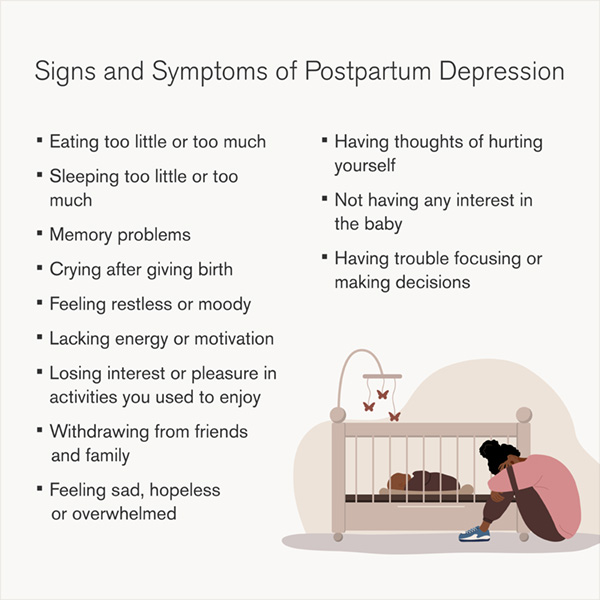
By Sandra Vega, MD, OB/GYN
Women's bodies go through many changes during pregnancy. But not much is explained about the changes mothers encounter after childbirth. Approximately one in nine mothers experience postpartum depression after giving birth. While some minor sadness or lack of emotion is normal, mothers should seek care from their health care provider if these negative emotions extend more than two weeks.
What is postpartum depression?
Postpartum depression is a serious mental illness that can affect your behavior and physical health. The birth of a baby can evoke many powerful emotions, including depression. This may interfere with your day-to-day life and might make you feel disconnected from your baby. These feelings can range from mild anxiety to severe depression.
Unfortunately, new mothers may feel embarrassed, ashamed or guilty about feeling depressed – they might be worried they'll be seen as a bad mother. Know that postpartum depression is not a character flaw, a weakness, or a reflection of you as a mother. Sometimes, it's simply a complication of giving birth. If you're diagnosed with the condition, prompt treatment can help you manage symptoms, feel better and create a connection with your baby.

Postpartum blues vs postpartum depression
There is a difference between what doctors call the "baby blues" and postpartum depression. Many new mothers experience "baby blues" and it is completely normal. Some of these symptoms can include mood swings, anxiety, irritability, crying and trouble sleeping. These symptoms usually resolve within 3 to 5 days.
Unlike "baby blues," postpartum depression is a more severe and long-lasting form of depression. While it may be mistaken for "baby blues," the symptoms are usually more intense and last longer. They may interfere with your ability to care for your baby, connect with your partner and handle daily tasks.
Causes of postpartum depression
Postpartum depression can be attributed to a complex interplay of factors, with hormonal changes being the main cause. During pregnancy, a woman's body undergoes profound physiological transformations to support the growing fetus. One of the key contributors to these changes is the surge in estrogen and progesterone, two crucial hormones that play pivotal roles in maintaining pregnancy and preparing the body for childbirth.
However, a dramatic shift occurs in the immediate postpartum period, typically within the first 24 hours after childbirth. As the placenta is expelled during delivery, the primary source of estrogen and progesterone production is abruptly removed. This sudden cessation triggers a rapid decline in hormone levels, causing them to plummet to their pre-pregnancy baseline.
During this hormonal upheaval, many women may experience emotional and psychological challenges. The sharp decline in estrogen and progesterone can disrupt the delicate balance of neurotransmitters in the brain, which are responsible for regulating mood and emotional well-being.
However, while hormonal changes are the most likely cause of postpartum depression, the condition is complicated and can be influenced by various biological, psychological, and social factors. These can include a woman's genetic predisposition to mood disorders, a history of depression or anxiety, stressful life events, inadequate social support, and the challenges of adapting to the demands of motherhood.
How is postpartum depression treated?
The two primary forms of postpartum depression treatment are therapy and medication, both of which play vital roles in helping individuals navigate this challenging period in their lives.
Seeking therapy, often in the form of individual counseling or support groups, is a fundamental component of postpartum depression treatment. Through therapy, individuals can gain insight into the underlying causes of their postpartum depression and learn coping mechanisms to effectively manage the emotional and psychological challenges associated with the condition. The supportive environment provided by therapy can foster a sense of connection, reducing feelings of isolation and offering valuable emotional support during a vulnerable time.
Medication is another crucial aspect of postpartum depression treatment. Antidepressants can help alleviate the symptoms of depression by regulating neurotransmitters in the brain that are often imbalanced. Some antidepressants are compatible with breastfeeding, allowing mothers to manage their depression while ensuring the well-being of their infants. However, the decision to use medication during breastfeeding should be made in consultation with a health care provider who can provide guidance on the safest and most suitable options.
The condition can be challenging and may significantly impact the lives of new mothers and their infants. Fortunately, effective postpartum depression treatments such as therapy and medication are available. Seeking help and support from health care professionals is crucial, ensuring the well-being of both the mother and her baby during this sensitive period.
When should I speak with my doctor?
Feeling a little down after giving birth is fairly normal. However, if these negative emotions last longer than two weeks or quickly become more severe, it's time to speak with your doctor.
Loyola Medicine is here to help all mothers. We provide comprehensive care for women who are experiencing postpartum depression and postpartum blues. These conditions can occur throughout pregnancy and up to one year after childbirth.
Loyola Medicine's primary and specialty care offices are conveniently located throughout Chicago’s western and southwestern suburbs. Our Obstetrics department at Loyola Medicine has one of the most comprehensive and advanced teams in the nation.
To make an appointment, call 888-584-7888 or schedule an appointment online.
Sandra Vega, MD, is an Obstetrician and Gynecologist at Loyola Medicine. Dr. Vega is certified with the American Board of Obstetrics and Gynecology. She completed her residency at Mercy Hospital and Medical Center.
Dr. Vega takes great pride in helping all mothers by answering questions and making every patient feel heard. She wants all mothers to feel comfortable going to see her or another physician if postpartum depression symptoms appear.
Book an appointment today to see Dr. Vega or another Loyola physician by self-scheduling an in-person or virtual appointment using myLoyola.

